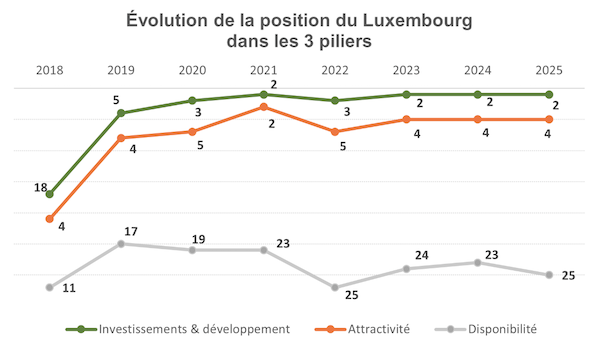 Evolution of Luxembourg’s Position Across the Three Pillars;
Credit: 2025 IMD World Talent Ranking
Evolution of Luxembourg’s Position Across the Three Pillars;
Credit: 2025 IMD World Talent Ranking
Luxembourg has climbed back to 2nd place in the 2025 IMD World Talent Ranking, after ranking 3rd last year.
At the top of the 2025 ranking was Switzerland (unchanged at #1), followed by Luxembourg (+1) and Iceland (+1). Hong Kong entered the top 5 in 4th place, while the Netherlands retained 5th. Singapore, which had risen to 2nd in 2024, dropped sharply to 7th this year. Sweden (-3) and Denmark (-3) slipped to 6th and 8th respectively.
The IMD report evaluates 69 economies on their ability to attract, develop and retain talent, based on three pillars: investment and development of home-grown talent, appeal to foreign talent and readiness, i.e. the availability of skills in the labour market.
In 2025, Luxembourg ranked 2nd for investment and development, 4th for appeal and 25th for readiness. The Grand Duchy retained its top position worldwide for public expenditure on education per pupil and for favourable pupil-teacher ratios in both primary and secondary education.
However, the report noted persistent challenges. Business leaders downgraded Luxembourg from 10th to 15th place for the quality of healthcare infrastructure and flagged the insufficient role of apprenticeships in the education system (28th). Luxembourg also continues to struggle with the availability of STEM graduates (22.9% of students; 35th) and qualified skilled labour, despite some improvement in the availability of senior managers (+6 places).
Luxembourg’s attractiveness for foreign talent remains strong, with the country consistently in the global top five (fourth in 2025). Strengths include one of the highest statutory minimum wages in the world (3rd) and a multilingual environment (6th). Yet challenges such as the rising cost of living - with Luxembourg falling from 40th to 49th place in just one year - and housing pressures were highlighted as concerns affecting quality of life.
Readiness remains Luxembourg’s weakest pillar, with the country ranking just 57th for the availability of skilled labour, a position largely unchanged over the past decade. This continues to pose a challenge for the country’s ecological and digital transitions, particularly in terms of recruiting specialised profiles.








